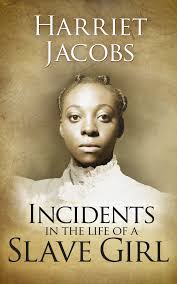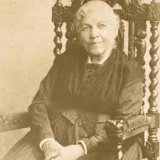Incidents in the Life of a Slave Girl Page #11
Incidents in the Life of a Slave Girl, written by herself is an autobiography by Harriet Jacobs, a mother and fugitive slave, published in 1861 by L. Maria Child, who edited the book for its author. Jacobs used the pseudonym Linda Brent.
My mistress grew weary of her vigils; they did not prove satisfactory. She changed her tactics. She now tried the trick of accusing my master of crime, in my presence, and gave my name as the author of the accusation. To my utter astonishment, he replied, "I don't believe it; but if she did acknowledge it, you tortured her into exposing me." Tortured into exposing him! Truly, Satan had no difficulty in distinguishing the color of his soul! I understood his object in making this false representation. It was to show me that I gained nothing by seeking the protection of my mistress; that the power was still all in his own hands. I pitied Mrs. Flint. She was a second wife, many years the junior of her husband; and the hoary-headed miscreant was enough to try the patience of a wiser and better woman. She was completely foiled, and knew not how to proceed. She would gladly have had me flogged for my supposed false oath; but, as I have already stated, the doctor never allowed any one to whip me. The old sinner was politic. The application of the lash might have led to remarks that would have exposed him in the eyes of his children and grandchildren. How often did I rejoice that I lived in a town where all the inhabitants knew each other! If I had been on a remote plantation, or lost among the multitude of a crowded city, I should not be a living woman at this day. The secrets of slavery are concealed like those of the Inquisition. My master was, to my knowledge, the father of eleven slaves. But did the mothers dare to tell who was the father of their children? Did the other slaves dare to allude to it, except in whispers among themselves? No, indeed! They knew too well the terrible consequences. My grandmother could not avoid seeing things which excited her suspicions. She was uneasy about me, and tried various ways to buy me; but the never-changing answer was always repeated: "Linda does not belong to me. She is my daughter's property, and I have no legal right to sell her." The conscientious man! He was too scrupulous to sell me; but he had no scruples whatever about committing a much greater wrong against the helpless young girl placed under his guardianship, as his daughter's property. Sometimes my persecutor would ask me whether I would like to be sold. I told him I would rather be sold to any body than to lead such a life as I did. On such occasions he would assume the air of a very injured individual, and reproach me for my ingratitude. "Did I not take you into the house, and make you the companion of my own children?" he would say. "Have I ever treated you like a negro? I have never allowed you to be punished, not even to please your mistress. And this is the recompense I get, you ungrateful girl!" I answered that he had reasons of his own for screening me from punishment, and that the course he pursued made my mistress hate me and persecute me. If I wept, he would say, "Poor child! Don't cry! don't cry! I will make peace for you with your mistress. Only let me arrange matters in my own way. Poor, foolish girl! you don't know what is for your own good. I would cherish you. I would make a lady of you. Now go, and think of all I have promised you." I did think of it. Reader, I draw no imaginary pictures of southern homes. I am telling you the plain truth. Yet when victims make their escape from the wild beast of Slavery, northerners consent to act the part of bloodhounds, and hunt the poor fugitive back into his den, "full of dead men's bones, and all uncleanness." Nay, more, they are not only willing, but proud, to give their daughters in marriage to slaveholders. The poor girls have romantic notions of a sunny clime, and of the flowering vines that all the year round shade a happy home. To what disappointments are they destined! The young wife soon learns that the husband in whose hands she has placed her happiness pays no regard to his marriage vows. Children of every shade of complexion play with her own fair babies, and too well she knows that they are born unto him of his own household. Jealousy and hatred enter the flowery home, and it is ravaged of its loveliness. Southern women often marry a man knowing that he is the father of many little slaves. They do not trouble themselves about it. They regard such children as property, as marketable as the pigs on the plantation; and it is seldom that they do not make them aware of this by passing them into the slave-trader's hands as soon as possible, and thus getting them out of their sight. I am glad to say there are some honorable exceptions. I have myself known two southern wives who exhorted their husbands to free those slaves towards whom they stood in a "parental relation;" and their request was granted. These husbands blushed before the superior nobleness of their wives' natures. Though they had only counselled them to do that which it was their duty to do, it commanded their respect, and rendered their conduct more exemplary. Concealment was at an end, and confidence took the place of distrust. Though this bad institution deadens the moral sense, even in white women, to a fearful extent, it is not altogether extinct. I have heard southern ladies say of Mr. Such a one, "He not only thinks it no disgrace to be the father of those little niggers, but he is not ashamed to call himself their master. I declare, such things ought not to be tolerated in any decent society!" VII. The Lover. Why does the slave ever love? Why allow the tendrils of the heart to twine around objects which may at any moment be wrenched away by the hand of violence? When separations come by the hand of death, the pious soul can bow in resignation, and say, "Not my will, but thine be done, O Lord!" But when the ruthless hand of man strikes the blow, regardless of the misery he causes, it is hard to be submissive. I did not reason thus when I was a young girl. Youth will be youth. I loved and I indulged the hope that the dark clouds around me would turn out a bright lining. I forgot that in the land of my birth the shadows are too dense for light to penetrate. A land Where laughter is not mirth; nor thought the mind; Nor words a language; nor e'en men mankind. Where cries reply to curses, shrieks to blows, And each is tortured in his separate hell.
Translation
Translate and read this book in other languages:
Select another language:
- - Select -
- 简体中文 (Chinese - Simplified)
- 繁體中文 (Chinese - Traditional)
- Español (Spanish)
- Esperanto (Esperanto)
- 日本語 (Japanese)
- Português (Portuguese)
- Deutsch (German)
- العربية (Arabic)
- Français (French)
- Русский (Russian)
- ಕನ್ನಡ (Kannada)
- 한국어 (Korean)
- עברית (Hebrew)
- Gaeilge (Irish)
- Українська (Ukrainian)
- اردو (Urdu)
- Magyar (Hungarian)
- मानक हिन्दी (Hindi)
- Indonesia (Indonesian)
- Italiano (Italian)
- தமிழ் (Tamil)
- Türkçe (Turkish)
- తెలుగు (Telugu)
- ภาษาไทย (Thai)
- Tiếng Việt (Vietnamese)
- Čeština (Czech)
- Polski (Polish)
- Bahasa Indonesia (Indonesian)
- Românește (Romanian)
- Nederlands (Dutch)
- Ελληνικά (Greek)
- Latinum (Latin)
- Svenska (Swedish)
- Dansk (Danish)
- Suomi (Finnish)
- فارسی (Persian)
- ייִדיש (Yiddish)
- հայերեն (Armenian)
- Norsk (Norwegian)
- English (English)
Citation
Use the citation below to add this book to your bibliography:
Style:MLAChicagoAPA
"Incidents in the Life of a Slave Girl Books." Literature.com. STANDS4 LLC, 2025. Web. 24 Feb. 2025. <https://www.literature.com/book/incidents_in_the_life_of_a_slave_girl_947>.








Discuss this Incidents in the Life of a Slave Girl book with the community:
Report Comment
We're doing our best to make sure our content is useful, accurate and safe.
If by any chance you spot an inappropriate comment while navigating through our website please use this form to let us know, and we'll take care of it shortly.
Attachment
You need to be logged in to favorite.
Log In